| Listing 1 - 10 of 12 | << page >> |
Sort by
|
Book
ISSN: 18739008 ISBN: 9004252169 1299691005 9004252150 Year: 2013 Volume: v. 20 Publisher: Leiden : Brill,
Abstract | Keywords | Export | Availability | Bookmark
 Loading...
Loading...Choose an application
- Reference Manager
- EndNote
- RefWorks (Direct export to RefWorks)
The Hekhalot literature is a motley collection of textually fluid and often textually corrupt documents in Hebrew and Aramaic which deal with mystical themes pertaining especially to God's throne-chariot (the Merkavah). They were composed between late antiquity and the early Middle Ages, with roots in earlier traditions and a long and complex subsequent history of transmission. This volume presents English translations of eclectic critical texts, with a full apparatus of variants, of most of the major Hekhalot documents: Hekhalot Rabbati ; Sar Torah ; Hekhalot Zutarti ; Ma'aseh Merkavah ; Merkavah Rabba ; briefer macroforms: The Chapter of R. Nehuniah ben HaQanah , The Great Seal-Fearsome Crown , Sar Panim , The Ascent of Elijah ben Avuyah , and The Youth ; and the Hekhalot fragments from the Cairo Geniza.
Hekhalot literature --- Merkava. --- Mysticism --- Cairo Genizah. --- History and criticism. --- Judaism. --- Heikhalot rabbati. --- Heikhalot zutrati. --- Maʻaśeh merkavah. --- Kitve-yad ha-Genizah.

ISSN: 07218753 ISBN: 3161456793 9783161456794 Year: 1992 Volume: 28 Publisher: Tübingen: Mohr,
Abstract | Keywords | Export | Availability | Bookmark
 Loading...
Loading...Choose an application
- Reference Manager
- EndNote
- RefWorks (Direct export to RefWorks)
Merkava --- Ascension of the soul --- Prayer --- History of doctrines --- Judaism --- Maʻaśeh merkavah --- Merkava. --- History of doctrines. --- Judaism. --- Maʻaśeh merkavah. --- Ascension of the soul - History of doctrines --- Prayer - Judaism
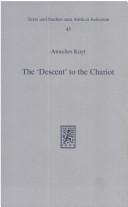
ISSN: 07218753 ISBN: 316146284X 9783161462849 Year: 1995 Volume: 45 Publisher: Tübingen: Mohr,
Abstract | Keywords | Export | Availability | Bookmark
 Loading...
Loading...Choose an application
- Reference Manager
- EndNote
- RefWorks (Direct export to RefWorks)
Merkava --- Mysticism --- Judaism --- 296*4 --- Joodse mystiek --- 296*4 Joodse mystiek --- Hebräisch. --- Hekhalot-literatuur. --- Hemelvaart. --- Himmelfahrt. --- Merkaba. --- Merkava in rabbinical literature. --- Merkava. --- Mystique --- Wortfeld. --- Judaïsme. --- Kuyt, Annelies. --- Heikhalot rabbati. --- Heikhalot zutrati. --- Heikhalot. --- Maaseh merkavah. --- Maʻaśeh merkavah. --- Merkava in rabbinical literature --- Rabbinical literature --- Maʻaśeh merkavah (Jewish mysticism) --- Merkabah --- Merkavah --- Throne of God --- Maʻaśeh merkavah. --- Hekhalot zuṭrati --- Hekhalot zutarti --- Hekhalot rabati --- Sefer Hekhalot rabati --- Sefer Pirḳe Hekhalot --- Pirḳe Hekhalot --- Masekhet Hekhalot --- Maʻaśeh ha-merkavah --- ʻInyan merkavah --- Pirḳe merkavah --- Sefer ha-merkavah --- Masekhet merkavah --- Mysticism - Judaism
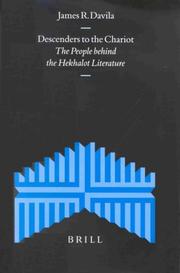
ISBN: 9004115412 9004496998 Year: 2001 Volume: 70 Publisher: Leiden Boston Köln Brill
Abstract | Keywords | Export | Availability | Bookmark
 Loading...
Loading...Choose an application
- Reference Manager
- EndNote
- RefWorks (Direct export to RefWorks)
Ma'aseh merkavah --- Merkabah --- Merkava --- Merkavah --- 296*41 --- Cabala --- -Hekhalot literature --- -Merkava --- Shamanism --- Religions --- Maʻaśeh merkavah (Jewish mysticism) --- Mysticism --- Throne of God --- Heikhalot literature --- Cabbala --- Jews --- Kábala --- Kabalah --- Kabbala --- Kabbalah --- Qabalah --- Jewish literature --- Magic --- History --- History and criticism --- Judaism --- 296*41 Kabbala --- Hekhalot literature --- Comparative studies
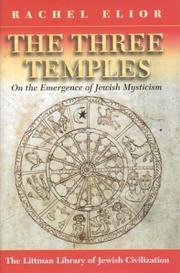
ISBN: 1874774668 9781904113331 9781909821040 1904113338 1909821047 Year: 2004 Publisher: Oxford ; Portland, Or. : Littman Library of Jewish Civilization,
Abstract | Keywords | Export | Availability | Bookmark
 Loading...
Loading...Choose an application
- Reference Manager
- EndNote
- RefWorks (Direct export to RefWorks)
In this ground-breaking study, Rachel Elior offers a comprehensive theory of the crystallization of the early stages of the mystical tradition in Judaism based on the numerous ancient scrolls and manuscripts published in the last few decades. Her wide-ranging research, scrupulously documented, enables her to demonstrate an uninterrupted line linking the priestly traditions of the Temple, the mystical liturgical literature found in the Qumran caves and associated directly and indirectly with the Merkavah tradition of around the second and first centuries BCE, and the mystical works of the second to fifth centuries CE known as Heikhalot literature. The key factor linking all these texts, according to Professor Elior's theory, is that many of those who wrote them were members of the priestly classes. Prevented from being able to perform the rituals of sacred service in the Temple as ordained in the biblical tradition, they channelled their religious impetus in other directions to create a new spiritual focus. The mystical tradition they developed centred first on a heavenly Chariot Throne known as the Merkavah, and later on heavenly sanctuaries known as Heikhalot. In this way the priestly class developed an alternative focus for spirituality, based on a supertemporal liturgical and ritual relationship with ministering angels in the supernal sanctuaries. This came to embrace an entire mystical world devoted to sustaining religious liturgical tradition and ritual memory in the absence of the Temple. This lyrical investigation of the origins and workings of this supernal world is sure to become a standard work in the study of early Jewish mysticism.
Hekhalot literature --- Merkava --- Mysticism --- Priests, Jewish --- 296*4 --- 296*4 Joodse mystiek --- Joodse mystiek --- Jews --- Dark night of the soul --- Mystical theology --- Theology, Mystical --- Spiritual life --- Negative theology --- Maʻaśeh merkavah (Jewish mysticism) --- Merkabah --- Merkavah --- Throne of God --- Heikhalot literature --- Cabala --- Judaism&delete& --- History --- Priests --- Judaism --- Hekhalot literature. --- Merkava. --- Priests, Jewish. --- History. --- Mysticisme --- Hékhalot --- Merkaba --- Prêtres juifs --- Judaïsme --- Histoire
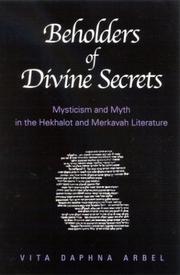
ISBN: 0791486850 1417537418 9781417537419 0791457230 9780791457238 0791457249 9780791457245 9780791486856 Year: 2003 Publisher: Albany, N.Y. State University of New York Press
Abstract | Keywords | Export | Availability | Bookmark
 Loading...
Loading...Choose an application
- Reference Manager
- EndNote
- RefWorks (Direct export to RefWorks)
Beholders of Divine Secrets provides a fascinating exploration of the enigmatic Hekhalot and Merkavah literature, the Jewish mystical writings of late antiquity. Vita Daphna Arbel delves into the unique nature of the mystical teachings, experiences, revelations, and spiritual exegesis presented in this literature. While previous scholarship has demonstrated the connection between Hekhalot and Merkavah mysticism and parallel traditions in Rabbinical writings, the Dead Sea Scrolls, apocalyptic, early Christian, and Gnostic sources, this work points out additional mythological traditions that resonate in this literature. Arbel suggests that mythological patterns of expression, as well as themes and models rooted in Near Eastern mythological traditions are employed, in a spiritualized fashion, to communicate mystical content. The possible cultural and social context of the Hekhalot and Merkavah mysticism and its composers is discussed.
Jewish mythology. --- Merkava. --- Hekhalot literature --- Mysticism --- Hebrew mythology --- Mythology, Hebrew --- Mythology, Jewish --- Mythology --- Maʻaśeh merkavah (Jewish mysticism) --- Merkabah --- Merkavah --- Throne of God --- Heikhalot literature --- Cabala --- History and criticism. --- Judaism. --- Judaism --- Jewish mythology --- Merkava --- 296*4 --- 296*4 Joodse mystiek --- Joodse mystiek --- History and criticism
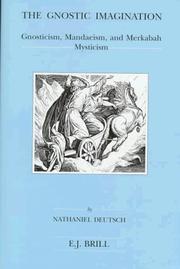
ISBN: 9004102647 9004672508 Year: 1995 Volume: .13 Publisher: Leiden ; New York ; Köln E.J. Brill
Abstract | Keywords | Export | Availability | Bookmark
 Loading...
Loading...Choose an application
- Reference Manager
- EndNote
- RefWorks (Direct export to RefWorks)
"The Gnostic Imagination is the first comprehensive study of the relationship between Gnosticism and Merkabah mysticism. It includes an exhaustive analysis of Gershom Scholem's views on the subject, an analytical survey of other secondary literature, and a focused examination of primary sources. The work explores a wide range of topics including myth, exegesis, ascent traditions, and cosmology. Although the main focus is on western Gnostic traditions and Merkabah mysticism, the book also includes relevant material from Mandaeism and from later stages of Jewish mysticism such as German Pietism and Kabbalah. Not only is this volume the first to survey and evaluate the history of scholarship on this complex subject, but it also creates new pathways for future studies by illuminating the crucial methodological and topical issues in the field. ".
Chretiens de Saint Jean --- Christians of St. John --- Disciples de Saint Jean --- Disciples of St. John --- Johanneschristenen --- Ma'aseh merkavah --- Mandaeans --- Mandaeers --- Mandaeisme --- Mandeeen --- Mandeeers --- Mandeens --- Mandeisme --- Mendaeans --- Merkabah --- Merkava --- Merkavah --- Nasoraeans --- Sabians --- St. John's Christians --- Judaism --- Gnosticism --- Mandaeans. --- Mysticism --- Merkava. --- Mandéens --- Mysticisme --- Merkaba --- Relations --- Gnosticism. --- Judaism. --- Judaïsme --- 273.1 --- -Judaism --- -Mandaeans --- -Dark night of the soul --- Mystical theology --- Theology, Mystical --- Spiritual life --- Negative theology --- Maʻaśeh merkavah (Jewish mysticism) --- Throne of God --- Christian heresies --- Jews --- Religions --- Semites --- Gnosis. Gnosticisme --- -Gnosticism --- History --- Religion --- -Gnosis. Gnosticisme --- 273.1 Gnosis. Gnosticisme --- -Maʻaśeh merkavah (Jewish mysticism) --- Dark night of the soul --- Mandéens --- Judaïsme --- Relations&delete& --- Christians of Saint John --- Disciples of Saint John --- Sabaeans (Mandaeans) --- Saint John's Christians --- Subbiyuns --- Religious adherents --- Cults
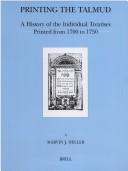
ISBN: 9004109099 9789004109094 9004679243 Year: 1999 Volume: 22 Publisher: Leiden: Brill,
Abstract | Keywords | Export | Availability | Bookmark
 Loading...
Loading...Choose an application
- Reference Manager
- EndNote
- RefWorks (Direct export to RefWorks)
Angels (Judaism) --- Anges (Judaïsme) --- Engelen (Jodendom) --- Ma'aseh merkavah --- Merkabah --- Merkava --- Merkavah --- Mediation between God and man --- Mysticism --- Judaism --- 296*4 --- 299.245 --- 325.1 --- -Merkava --- -Dark night of the soul --- Mystical theology --- Theology, Mystical --- Spiritual life --- Negative theology --- Maʻaśeh merkavah (Jewish mysticism) --- Throne of God --- Intercession between God and man --- Mediator between God and man --- Mediation --- Joodse mystiek --- Mandeeërs. Mandaiten. Christenen van Sint Jan --- Binnenlandse migratie. Interne migratie --- Religious aspects --- -Joodse mystiek --- 325.1 Binnenlandse migratie. Interne migratie --- 299.245 Mandeeërs. Mandaiten. Christenen van Sint Jan --- 296*4 Joodse mystiek --- -Maʻaśeh merkavah (Jewish mysticism) --- Dark night of the soul --- Angels --- Mediation between god and man --- Mediation between God and man - Judaism --- Mysticism - Judaism
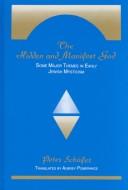
ISBN: 1438418825 0585075271 9780585075273 9780791410431 0791410439 9780791410448 0791410447 0791410439 0791410447 9781438418827 Year: 1992 Publisher: Albany (N.Y.): State university of New York press,
Abstract | Keywords | Export | Availability | Bookmark
 Loading...
Loading...Choose an application
- Reference Manager
- EndNote
- RefWorks (Direct export to RefWorks)
Merkava. --- Mysticism --- Maʻaśeh merkavah (Jewish mysticism) --- Merkabah --- Merkavah --- Throne of God --- Judaism --- History. --- Hebrew book of Enoch. --- Shiʻur komah. --- Heikhalot zutrati. --- Heikhalot rabbati. --- Hekhalot zuṭrati --- Hekhalot zutarti --- Hekhalot rabati --- Sefer Hekhalot rabati --- Sefer Pirḳe Hekhalot --- Pirḳe Hekhalot --- Third Enoch (Apocryphal book) --- Book of Enoch, Hebrew --- Bible. --- Enoch, Hebrew book of --- Heikhalot --- Sefer Heikhalot --- Hebrew Enoch --- Third book of Enoch --- 3 Enoch (Apocryphal book) --- Sefer Hekhalot --- Hekhalot --- 3rd Enoch (Apocryphal book) --- 3rd book of Enoch --- Shiʻur qomah --- Sefer ha-ḳomah --- Mysticism - Judaism - History. --- Shiur komah.
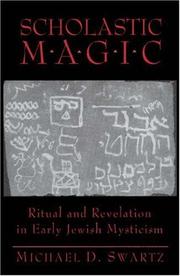
ISBN: 0691010986 1306984203 1400864410 0691605912 Year: 1996 Publisher: Princeton, NJ Princeton University Press
Abstract | Keywords | Export | Availability | Bookmark
 Loading...
Loading...Choose an application
- Reference Manager
- EndNote
- RefWorks (Direct export to RefWorks)
In exploring the social background of early Jewish mysticism, Scholastic Magic tells the story of how imagination and magic were made to serve memory and scholasticism. In the visionary literature that circulated between the fifth and ninth centuries, there are strange tales of ancient rabbis conjuring the angel known as Sar-Torah, the "Prince of the Torah." This angel endowed the rabbis themselves with spectacular memory and skill in learning, and then taught them the formulas for giving others these gifts. This literature, according to Michael Swartz, gives us rare glimpses of how ancient and medieval Jews who stood outside the mainstream of rabbinic leadership viewed Torah and ritual. Through close readings of the texts, he uncovers unfamiliar dimensions of the classical Judaic idea of Torah and the rabbinic civilization that forged them.Swartz sets the stage for his analysis with a discussion of the place of memory and orality in ancient and medieval Judaism and how early educational and physiological theories were marshaled for the cultivation of memory. He then examines the unusual magical rituals for conjuring angels and ascending to heaven as well as the authors' attitudes to authority and tradition, showing them to have subverted essential rabbinic values even as they remained beholden to them. The result is a ground-breaking analysis of the social and conceptual background of rabbinic Judaism and ancient Mediterranean religions. Offering complete translations of the principal Sar-Torah texts, Scholastic Magic will become essential reading for those interested in religions in the ancient and medieval world, ritual studies, and popular religion.Originally published in 1996.The Princeton Legacy Library uses the latest print-on-demand technology to again make available previously out-of-print books from the distinguished backlist of Princeton University Press. These editions preserve the original texts of these important books while presenting them in durable paperback and hardcover editions. The goal of the Princeton Legacy Library is to vastly increase access to the rich scholarly heritage found in the thousands of books published by Princeton University Press since its founding in 1905.
Jewish magic --- Joodse magie --- Ma'aseh merkavah --- Magic [Jewish ] --- Magie [Joodse ] --- Magie juive --- Merkabah --- Merkava --- Merkavah --- Intercessory prayer --- -Magic, Jewish --- -Rabbis --- -Jewish rabbis --- Jewish scholars --- Magic, Jewish --- Magic, Semitic --- Intercession (Prayer) --- Functionaries --- -Joodse mystiek --- Jewish rabbis --- Mysticism --- Rabbis --- 296*4 --- 296*4 Joodse mystiek --- Joodse mystiek --- Clergy --- Judaism --- Dark night of the soul --- Mystical theology --- Theology, Mystical --- Spiritual life --- Negative theology --- Judaism&delete& --- History --- Heikhalot rabbati. --- Maʻaśeh merkavah. --- Masekhet Hekhalot --- Maʻaśeh ha-merkavah --- ʻInyan merkavah --- Pirḳe merkavah --- Sefer ha-merkavah --- Masekhet merkavah --- Hekhalot rabati --- Sefer Hekhalot rabati --- Sefer Pirḳe Hekhalot --- Pirḳe Hekhalot --- Prayers and devotions --- Rabbis - Prayer-books and devotions. --- Intercessory prayer - Judaism. --- Sar Torah texts --- Jewish magic. --- Judaism. --- History. --- Maaseh merkavah.
| Listing 1 - 10 of 12 | << page >> |
Sort by
|

 Search
Search Feedback
Feedback About UniCat
About UniCat  Help
Help News
News